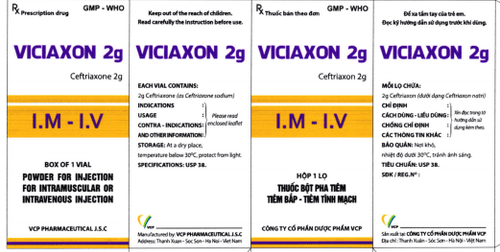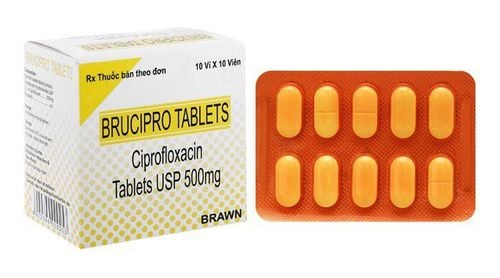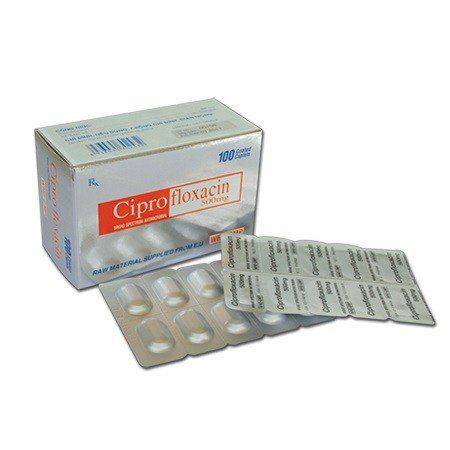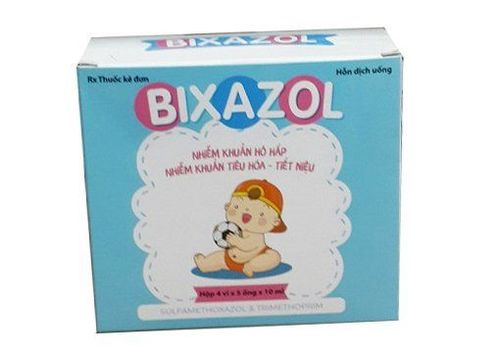This is an automatically translated article.
Frazine drug is used by intramuscular or intravenous injection, to treat cases of respiratory tract, skin and urinary tract infections, ... At the same time, it helps prevent postoperative infections. To use Frazine effectively and prevent the risk of side effects, patients need to strictly follow the treatment regimen previously recommended by the doctor.
1. What is Frazine?
Frazine is an antibiotic prescribed for the treatment of inflammatory conditions such as respiratory tract infections, urinary tract infections, cholecystitis, peritonitis and pelvic inflammatory disease,... Currently, Frazine is used as a treatment. Prepared and manufactured by Kyung Dong Pharm Co., Ltd – Korea in the form of powder for injection.
Each vial of Frazine contains the main active ingredient, Ceftriaxone, with a concentration of 1g. In addition, the manufacturer also added a number of other auxiliary excipients with sufficient drug content.
2. What are the uses of Frazine?
2.1 Effect of the active ingredient Ceftriaxone Ceftriaxone acts as a 3rd generation Cephalosporin, widely used as an injection to treat infections caused by bacteria. Ceftriaxone's general mechanism of action is bactericidal by virtue of its ability to inhibit their growth.According to research, bacterial cell wall biosynthesis is inhibited by ceftriaxone binding to penicillin-binding protein (PBP). These are all proteins involved in the construction of bacterial cell membranes.
In addition, Ceftriaxone is also applied before dental procedures for people with heart disease (such as artificial heart valves) to prevent the risk of heart infections, especially endocarditis. by bacteria.
2.2 Indications and contraindications to the use of Frazine drugs Frazine drugs are used according to the doctor's prescription to treat the following infections:
Respiratory tract infections. Ear-nose-throat infection. Renal - urogenital infections. Septicemia . Meningitis. Prophylaxis of skin, bone and joint infections, postoperative infections. Wound and soft tissue infections. Cholecystitis. Peritonitis. Biliary tract inflammation. Gastrointestinal infections. Infections in immunocompromised patients. Abdominal infection. Gonorrhea . Contraindications:
Contraindicated Frazine for people who are allergic or have hypersensitivity reactions to Cephalosporin or any of the ingredients contained in the drug. Do not use Frazine for people with kidney failure, premature infants or people with a history of allergy to penicillin. Relative contraindications Frazine for pregnant women or nursing mothers.
3. How much should Frazine be used?
Frazine is made in the form of a powder for injection. The drug will therefore be given by injection IM (intramuscularly) or IV (intravenously). The following is a specific dose of Frazine based on the general recommendations of the doctor:
Dosage for adults and children over 12 years: Inject 1-2g/day, or 4g/day for severe cases. Dose for children from 15 days old to 12 years old: 20-80mg/kg body weight injection. Dose for children under 14 days old: Inject dose from 20-50mg/kg body weight/day. Dose to treat meningitis: Inject dose of 100mg/kg/time/day. A maximum dose of 4 g/day may be used. Dosage for treatment of gonorrhea: 250mg single intramuscular injection. Dose to prevent postoperative infections: Administer about 30-90 minutes before surgery with a dose of 1-2g. Frazine is to be used under the supervision of a doctor. Therefore, patients should avoid self-medication without a prescription.
4. What side effects does Frazine cause?
In case of experiencing warning signs of an allergic reaction after Frazine injection, such as swelling of the face, swelling of the tongue, swelling of the lips, swelling of the throat, rash or difficulty breathing, the patient should seek medical attention. immediately for treatment. In addition, the patient should also notify the doctor as soon as possible when some of the following serious side effects appear:
Watery or bloody diarrhea. Chills, fever, rash, swollen glands, itching, tired feeling or joint pain. White spots or sores appear on the lips or in the mouth. Unusual bleeding from the mouth, nose, rectum, or vagina. Purple or red spots appear under the skin. Skin bruising, skin rash, muscle weakness, muscle pain, or severe itching. Pale skin, confusion, weakness, or dark urine. Difficulty urinating, urinary retention, or urinating less than usual. Convulsions or seizures. Painful swelling/irritation at the injection site. The stool is chalky. Nausea, bloating, heartburn or stomach pain after eating. Severe abdominal pain that may radiate to the back. Serious skin reactions such as sore throat, fever, burning eyes, skin pain, swelling of the tongue/face, cyanosis, rash, peeling or blistering of the skin. Some less serious side effects can occur with Frazine treatment, including:
Vomiting, stomach pain. Irritation, pain, or a hard lump at the injection site. Swollen tongue itching. Overreaction, headache, dizziness. Vaginal itching. Sweat a lot. Not all patients who take Frazine experience these side effects. In some cases, there may be other adverse reactions not mentioned. If there are any concerns about the side effects after taking Frazine, the patient should discuss specifically with a specialist.
5. Some important notes when using Frazine
5.1 Medical conditions that may affect Frazine In fact, a number of health conditions can have adverse effects on the use of Frazine. Patients should tell their doctor before deciding to treat with Frazine if they have any of the following health problems:Diarrhea . Anemia. Pancreatitis. Gallbladder disease. Have a history of stomach or intestinal disease, such as colitis. Hyperbilirubinemia (Do not give Frazine to neonates < 28 days of age or premature infants with this condition). Liver or kidney disease. Malnutrition (taking Frazine can make the condition worse and the patient needs extra vitamin K). 5.2 What precautions should be taken while using Frazine? Here are some notes that patients need to be aware of when taking Frazine to ensure safety and early effectiveness:
Caution when starting Frazine treatment for patients with diabetes, arrhythmias heart disease or an allergy to penicillin. There is not enough research to prove that Frazine is safe for pregnant women and nursing mothers. Therefore, these patients need to consult their doctor before deciding on treatment. Frazine should be avoided with certain other medications to avoid the potential for interactions, including Calcium gluceptate, Calcium chloride, Calcium acetate, Ringer's solution, Lactated ringer's solution, and diuretics. Ideally, patients should tell their doctor about any medications they are currently taking, including supplements, supplements, vitamins, supplements, or herbs. If a missed dose of Frazine is missed, the patient needs to quickly make up the dose (about 1-2 hours after the missed dose). Avoid taking it too close to the time of your next dose or injecting a double dose as prescribed. In case of overdose of Frazine and experiencing adverse reactions, the patient should stop treatment and notify the doctor immediately for timely treatment. The physician may administer supportive treatments to relieve the symptoms of overdose. Check the expiry date of Frazine before using it to avoid the case that the injection has expired. If Frazine injection powder shows signs of abnormality in texture, color or appearance of mold, the patient should discontinue treatment. Above is all information about Frazine, patients need to carefully read the instructions for use, consult a doctor / pharmacist before using. Note, Frazine is a prescription drug, patients absolutely must not buy and treat at home because they may experience unwanted side effects.













